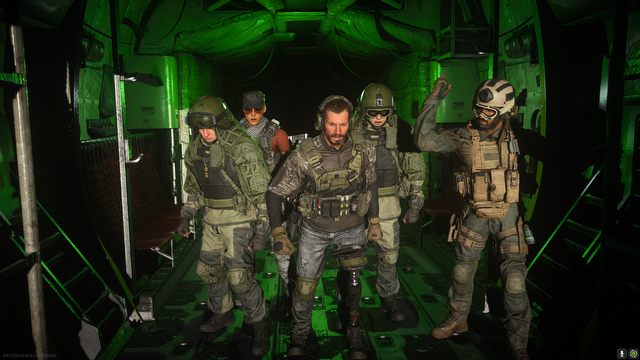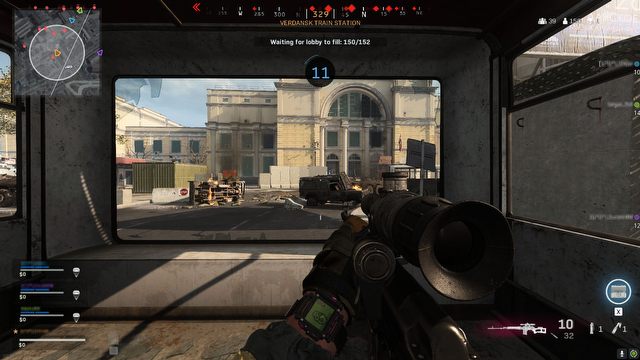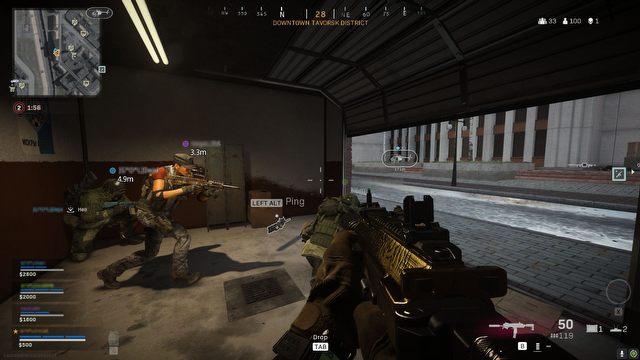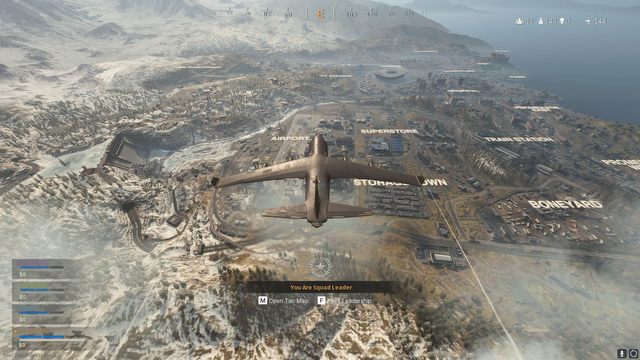Weird Times, When Online Shooter Preserves Friendship
Call of Duty: Warzone moved my entire social life to the fictional Verdansk. Unfortunately, all my problems followed.
The review is based on the PC version. It's also relevant to PS4, XONE version(s).

Martin, 29, joins the game for the first time. He's playing on a laptop with a mouse connected because he thinks it's a thousand times better than a gamepad. It doesn't seem to help, really. We die together, minutes after we drop off at Verdansk. We speak through microphones and I can hear in his voice that he's not having a particularly great time. In the second or third game, with bullets whizzing by, we hide in one of the houses. We hear shots fired in the distance. A helicopter's rotor slaps the air in the distance with great force, sending wobbling pressure waves from afar. A truck passes by down the road. We can hear the floor creaking, door opening. We're sure we're not alone. We die moments later – a sniper first takes me down, then my friend, as he's trying to revive me. The tension, excitement and feeling of danger are the fuel of the night, and we stay up until two in the morning.
There's five of us, so one person can always take a break. And there's somebody playing nearly at any given time of the day – beckoning, tantalizing, and messing up daily schedules. I haven't seen some of them since February, and all those people are my good, "real-life" friends. Before the epidemic, we used to spend a lot of time in pubs playing darts. It was our slightly pathological form of shared entertainment. We could get together, play darts for hours in a smoky den, stay up till the red morning light, then come to work with bloodshot eyes. At times, we'd enter the zone, and completely stop talking, only non-verbally exchanging information: Whose turn is it, where's my darts, who hit bulls-eye, who cleared my score, are we playing double-out? 301, 501 or cricket? And of course: who's buying the next round?
Aggressive therapy
I guess we all came to these meetings for different purposes. I just loved spending time with friends and mellow out after a hard day. Among friends, in a place where I knew the bartender by name, and where the speakers emitted simple, uncompromising punk rock. I am not a terribly effusive, either. I do not readily talk about my inner experience, no matter how violent it is. In most situations, I'm perfectly fine with basic interaction, casual conversations, silly jokes and jabs. Simple comradery.
Of course, this "simple comradery" is underlined by hours upon hours of discussion, debates, and arguments. We knew that spending time together was working wonders for us, even if we thought we had already known everything about each other. We knew our strengths and we knew our flaws even better. Perhaps that's why Call of Duty: Warzone is the game that drew us so relentlessly. In these weird times, entering the game's lobby and our Discord channel became substitute for darts and beers. How are you? How's life? How's work? How's your girl? Where are we going? Should we play contracts? Who has sniper ammunition?
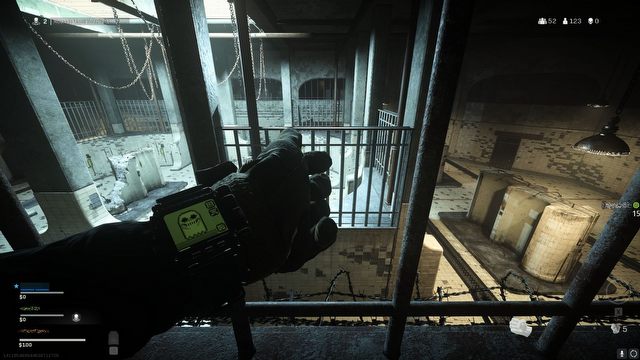
This is the gulag. You get here after death. Your friends, if they get here with you, can spot enemies.
You see, I'm a rather difficult person. Bearing up with me takes a little getting-used to. And why should anyone care? Hence, I have nothing but admiration for all those who, after all, are able to take up with me. For some time, my friends and I have been wondering – especially during the period of the tightest lockdown – how we can we still get together, not lose touch. We tried webcam meetings, but playing virtual Sword & Sorcery for the 50th time is not exactly the definition of quality time. And then (I still wonder how I was able to) I managed to convince them to try Warzone. And so it begun.
Rocky way to addiction
We're not very good at this. Playing solo, most of us are able to win a game every now and then, but as a team, we can barely climb to the second place. We lack, above all, discipline. Our improvised voice communication rattles, hums, and breaks concentration – a little because we crossplay, and a little because of the fact that this is the first online game my friends are playing. During a one-on-one clutch, instead of keeping quiet, they go about our poor aim, and the apparently superhuman accuracy of the enemy. David, to whom the moniker "the General" already stuck as he's particularly fond of giving orders, also the kind that sends the entire team into oblivion, keeps dropping out of Discord. Martin has two pairs of headphones on – in-ear for the game, and over-ear for communication. Paul communicates using the phone's microphone, which inadvertently picks out ambient sounds and noises, and Luke plays a shooter game on a game pad for the first time in his entire life. And there's me, insubordinate, singing Jester, rushing the enemy without a clue. Meeting this dirty quintet on your way in Warzone must be quite an experience, potentially traumatizing.
There's now supposedly 60 million players just like us around the world. From different continents and different countries – of different ages, different backgrounds, beliefs and education. I encountered people who can barely put a sentence together, and with those who spoke with the eloquence of an ancient philosopher. Warzone activates brief voice channel between the player who scores a frag and their victim. I once was able to bash my enemy to death after running out of ammo. Warzone activated the microphone and on the other side, I heard what sounded like an eight-year-old boy who, at the verge of tears, shouted: "I HATE you!”
A few days after we started playing together (and occasionally waking up neighbors, shouting "TO THE RIGHT! TO THE LEFT! WATCH OUT! ABOVE YOU!!!"), one of us finally noticed that Warzone was becoming our common problem. We joke about it a lot. No one really talks about games being as destructive as alcohol or drugs.
This realization comes to me five minutes before an important, work-related video call. I'm about to meet my CEO, and instead of focusing on company stuff, all I can think about is Verdansk and the hope that the guys will have time for a joint operation. There are days when we spend five to eight hours on Warzone's servers. Most of us are in our mid-30s, trying to live a normal life, even now. In our lives, five to eight hours a day for games is about four to seven hours too many.
Call of Duty: Warzone has been surprisingly successful for a market that has already seen battle royale the like of Fortnite, PUBG and Apex Legends. It managed to combine an addictive battle royale formula with an equally addictive and satisfying Call of Duty gunplay. The map itself – Verdansk – is an interesting and well-made. In some incomprehensible way, Activision, Infinity Ward and Raven Software have created a dangerously addictive game. And I say this as a person who doesn't like online shootings nor battle royale, and in whom the name Fortnite evokes associations with rainbow-colored puke.
I don't know for what reason you guys, gals, and everyone in-between have to play video games – for me, even though I gait paid for it sometimes, it's still a matter of pleasure. Playing also gives me a sense of security, fulfillment and fulfills a few other, more trivial needs. Sometimes, these are needs that have nothing to do with entertainment per se – such as solving problems. And since life is a tricky bastard, addiction often sneaks up on you in the mantle of help, relaxation, and activation, whereas in actuality, the escapism is only meant to fulfill a void, which for reasons that are never quite clear to me, relentlessly knocks at your door every day. And though – because I studied journalism rather than psychology – I say this with a dose of irony, I think you should all be on your guard.
I'm not complaining. I can even openly say it. Call of Duty: Warzone helped me preserve my friendships and actually elevated them to a world where COVID-19 is at best the grim nickname of a random player. Along with my life, I also took my problems to Verdansk: maybe I use the game to hide. I'm concerned that I tend to rage. Although we as our avatar, which most often is said to be a commando, superhero, psychopath or a titan able to move mountains, we know that on the other side, there's people capable of laughter, tears, anger and even hatred, who is are not bulletproof.
And while we still enjoy playing together – and will certainly continue to do so in the future – I think we all just want to be able to play darts in the pub again. Remember, however, that unforeseen encounters with buddies from the military, prison, or school bench can become a problem for the people around you. The virus hasn't gone anywhere. Also make sure that if Warzone, or any game, for that matter, helps you stay sane in times of pandemic, it doesn't also damage your most intimate relationships "irl." And that you don't skip eating a proper meal because you're playing. Spending eight hours yelling into a microphone – no matter how much you want to romanticize it – isn't something incredibly praiseworthy. And it sure as hell is difficult to explain to your partner.
